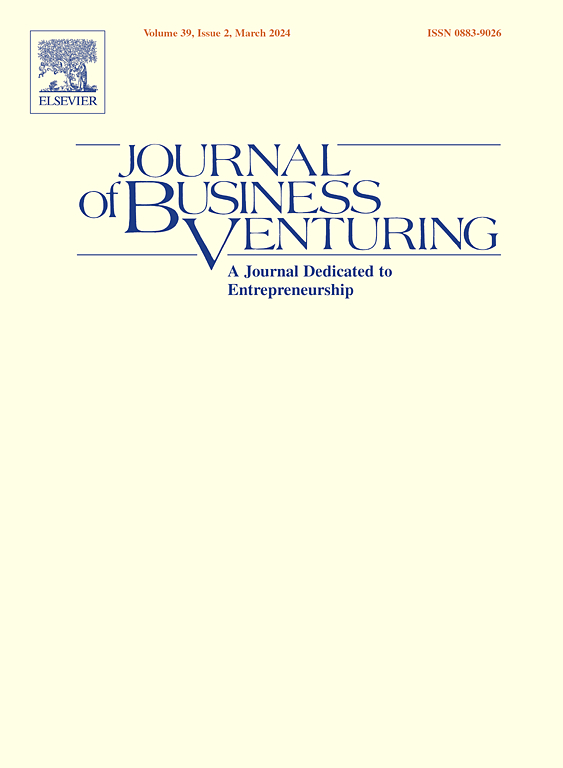你不知道的“魔鬼”:与陌生人共同创业的利弊测试
IF 8.9
1区 管理学
Q1 BUSINESS
引用次数: 0
摘要
创业和成功的一个关键是把“人”这部分做好。专业投资者强烈倾向于为创业团队融资,而不是为个人融资。这种偏好是基于这样一种信念,即创业需要经验、技能和人脉的组合,而很少有人拥有这些。这一论点隐含着这样一种信念,即团队的收益超过了联合创始人因信息不对称而产生的成本。这种信息不对称在与陌生人建立关系时更大,因为之前没有关系经验。然而,陌生人更有可能提供联合创始人理论上的(独特的)增值,比如非冗余网络。不幸的是,由于数据的限制,文献并没有评估与陌生人共同创业的利弊假设,从而限制了我们让新企业的人“正确”参与的能力。我们对三千多家成功发起众筹活动的新企业使用独特的调查数据来评估这些假设。这些调查数据包括足够多的有陌生人的团队,以及团队功能、产品/服务交付和运营状态的细粒度度量,以进行全面评估。结果显示,团队中包含陌生人的新企业不太可能交付他们所宣传的产品/服务,而且更有可能无法运营。直接的、描述性的证据表明,与团队相关的问题是这些结果的基础。本文章由计算机程序翻译,如有差异,请以英文原文为准。
The “devil” you don't know: A test of the detriments and benefits of co-founding with strangers
One key to new venture creation and success is getting the “people part” right. Professional investors have a strong preference for funding founding teams of people rather than individuals. This preference is based on the belief that starting a new venture requires a portfolio of experiences, skills, and networks that few individuals possess. Implicit in this thesis is the belief that the benefits of a team outweigh its costs that can accrue with co-founders arising from information asymmetries. Such information asymmetries are greater when founding with strangers given an absence of prior relational experience. Yet, strangers are more likely capable of providing the theorized (unique) value-add of co-founders such as non-redundant networks. Unfortunately, due to data limitations, the literature has not assessed assumptions concerning the pros/cons of co-founding with strangers thereby limiting our ability to get the people part of new ventures “right.” We use unique survey data on more than three thousand new ventures that successfully launched a crowdfunding campaign to assess these assumptions. These survey data include enough teams with strangers and granular measures of team functioning, product/service delivery, and operational status for comprehensive assessments. Results reveal that new ventures including strangers on the team are less likely to deliver the product/service they pitched and are more likely to be non-operational. Direct, descriptive evidence suggests that team-related issues underlie these outcomes.
求助全文
通过发布文献求助,成功后即可免费获取论文全文。
去求助
来源期刊

Journal of Business Venturing
BUSINESS-
CiteScore
16.70
自引率
6.90%
发文量
59
审稿时长
77 days
期刊介绍:
The Journal of Business Venturing: Entrepreneurship, Entrepreneurial Finance, Innovation and Regional Development serves as a scholarly platform for the exchange of valuable insights, theories, narratives, and interpretations related to entrepreneurship and its implications.
With a focus on enriching the understanding of entrepreneurship in its various manifestations, the journal seeks to publish papers that (1) draw from the experiences of entrepreneurs, innovators, and their ecosystem; and (2) tackle issues relevant to scholars, educators, facilitators, and practitioners involved in entrepreneurship.
Embracing diversity in approach, methodology, and disciplinary perspective, the journal encourages contributions that contribute to the advancement of knowledge in entrepreneurship and its associated domains.
 求助内容:
求助内容: 应助结果提醒方式:
应助结果提醒方式:


